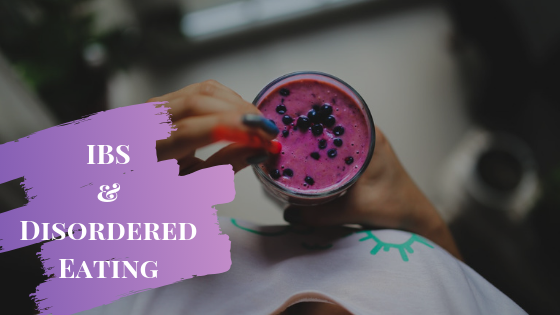Food anxiety can be a common issue for many IBS sufferers. In the majority of cases, it’s caused by an overwhelming fear of eating the wrong thing and causing a flare-up. The majority of diets designed to address IBS related issues can contribute to disordered eating tendencies. A reason for this could be due to the restrictive nature of these diets. Yet, proper nutrition reigns supreme when it comes to decreasing IBS symptoms. Understanding the link between food anxiety and IBS can be helpful when learning more about how to properly get relief for this condition.
Page Contents
When Dietary Restrictions Become Food Anxiety
Disordered eating tendencies are quite common for those with IBS. This could be due to the fact that for those with IBS food can quickly become your enemy. Eating the wrong food can send your body spiraling into a flare-up. And nothing sucks worse than an IBS flare-up. Regardless of what IBS type you have flare-ups are no joke. The bloating, gassiness, trips to the bathroom and feelings of hatred towards your body can be intense.
Needless to say, adhering to an IBS friendly diet and restricting food triggers and food intolerances can become well pretty restrictive. It can at times reach a point where it feels as though your body is at war with food. Which leads to feelings of confusion since food is one of the vital and basic things needed to survive and be healthy.
The process of healing your gut can be expensive and lengthy. Finding yourself thrust into a new style and way of eating creates its own set of challenges. Indeed, if you’re working through any type of elimination diet there are various phases you will go through and specific foods you must avoid. The anxiety caused by searching for suitable replacements and finding specialty foods that align with the diet is real. In most cases, these specialty foods can be expensive and put a strain on your budget. Additionally, transitioning to an IBS style diet also presents unique challenges. There are specific guidelines regarding what foods you should and shouldn’t eat. Additionally, there are trigger foods and food intolerances to bear in mind. This can lead to an increase in the amount of time you spend planning, prepping and preparing meals.
How Food Anxiety Causes Disordered Eating
All of these struggles can increase your food anxiety and cause you to become distrustful of food. This may also lead you to doubt your ability to choose what foods are right for you. If you’re not a world-class chef increasing the time you spend in the kitchen cooking meals can be intimidating. Additionally, not being able to afford IBS friendly foods can also increase food anxiety. Consequently, having to explain all these changes to family and friends can elicit judgment, and lead to awkward social interactions. The combination of these issues can cause you to struggle with following an IBS diet. It may also increase your risk of slipping into disordered eating habits.
An additional issue with IBS-related disordered eating is the fact that it’s not easily noticed. In truth, those with digestive issues quite commonly have disordered eating habits that are undiagnosed. These issues are left untreated because the focus is placed on using nutritional changes to decrease and manage symptoms. In other words, it’s fairly easy to have a disordered eating issue in combination with IBS that goes unnoticed. This is especially true if you are following a specialty diet as part of your treatment protocol. On the outside, all of these things appear normal and it looks like you’re being vigilant in doing what you’re supposed to do.

Do You Struggle With These Disordered Eating Habits?
You may struggle with disordered eating tendencies if you find that you are:
- Experiencing increased anxiety regarding potential trigger foods
- Following rigid food rituals and routines such as staying in the elimination phase of a diet because you’re scared to experience a flare-up
- Skipping meals
- Refraining from eating around others or isolating yourself from social situations that involve food and eating because you are stressed about knowing what and how to eat around friends and family
- Feeling a loss of control over food in which you feel compelled to binge, fast, or purge food in order to manage symptoms or prevent flare-ups
- Becoming fixated on healthy foods or “good” versus “bad” foods and having an overall bad relationship with food due to trigger foods and food intolerances
- Stressing because you feel as though you are unable to make decisions regarding what foods to eat because it seems as though all foods cause a bad reaction
Overcoming Food Anxiety
In order to properly overcome disordered eating, it’s crucial to heal negative food relationships. This isn’t something that you can or should go alone. Especially since your idea of healthy and unhealthy is skewed. Working with a therapist that specializes in disordered eating can help you get to the bottom of the issue. That way you know what’s triggering your food anxiety. Treating the emotional and mental hang-ups that are contributing to your food anxiety can be beneficial. This allows for proper solutions to be found that will help you to overcome these roadblocks. Building a healthy relationship with food can help you properly manage your IBS.
Next, working with a Nutritionist or Registered Dietician can help you learn how to properly utilize nutrition to decrease symptoms. Dietitians and nutritionists can safely guide you through an elimination diet or low fodmap diet. These specialized diets help you identify trigger foods, food intolerances, as well as choosing an appropriate dietary style for you that isn’t too restrictive.
Lastly, learn about different options available to you in regards to your food budget. Finding creative ways to budget for foods that align with your diet and how to prepare easy meals can be beneficial. Additionally, a dietician or wellness coach can help provide ideas for how to create IBS friendly meals. These meals do not have to be bland and expensive but can indeed align with your budget and taste delicious. Looking into meal delivery services that provide options that are gluten-free or dairy-free can also be a helpful bonus. Learning how to plan and prep meals properly can increase your confidence while saving you time and money.

Keep A Food Journal
In addition to seeking help from qualified professionals taking the time to keep a food journal may be beneficial. This can provide insight as to potential trigger foods and food intolerances. Additionally, you can uncover emotional eating patterns and disordered eating tendencies. Consequently, a food journal is an effective tool in revealing your mindset towards dieting and food in general. Your RD or therapist may find this beneficial in your treatment plan.
Consider talking with your therapist or RD to see if an intuitive eating approach would be a good option for you. This approach may help you learn how to heal your relationship with food. Additionally, it can help you manage your IBS without anxiety and disordered eating tendencies. You can create a healthy relationship with food and successfully manage your IBS with time and patience.
Don’t Go It Alone
If you’re struggling with IBS and experiencing food anxiety issues work with a professional. Making dietary changes on your own can have a negative impact on your condition and make it worse. Invest in a Dietician and Wellness Coach that can help you navigate the transition to an IBS diet. This can be the difference between you continuing to struggle with IBS and finally achieving balance.
About the Author.
 Hi, my name is Kathleen but you can call me Kat. I am an Esthetician, Lifestyle Wellness Coach, Content Creator, and Writer. My intention is to provide you with education and awareness about women’s health, nutrition, fitness, beauty, wellness, and lifestyle. I primarily help women that are seeking holistic and natural solutions to managing their chronic condition, improving their lifestyle and combating anti-aging concerns. I offer coaching programs and courses that are designed to help you redefine your health and defy aging. You can find my content on a variety of social media platforms such as YouTube, Facebook, and Instagram.
Hi, my name is Kathleen but you can call me Kat. I am an Esthetician, Lifestyle Wellness Coach, Content Creator, and Writer. My intention is to provide you with education and awareness about women’s health, nutrition, fitness, beauty, wellness, and lifestyle. I primarily help women that are seeking holistic and natural solutions to managing their chronic condition, improving their lifestyle and combating anti-aging concerns. I offer coaching programs and courses that are designed to help you redefine your health and defy aging. You can find my content on a variety of social media platforms such as YouTube, Facebook, and Instagram.
If you take the opportunity to visit me on my other platforms don’t hesitate to leave a message, I would love to hear from you!
Join My Email List!
Receive my FREE Course The Beginners Guide to Anti-Aging and get my blog posts delivered directly to your inbox.
[gravityform id=”1″ title=”true” description=”true”]






